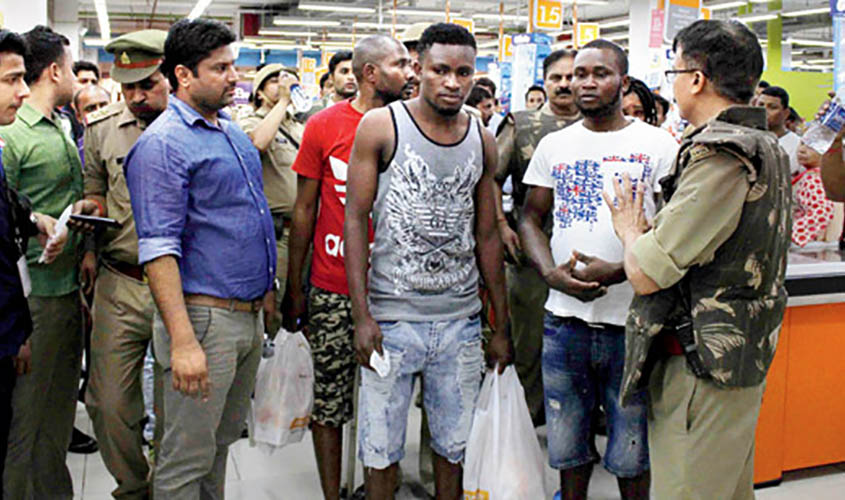The national capital region made news, once again, for all the wrong reasons. Dozens of Africans faced unprovoked and incomprehensible attacks by hundreds of Greater Noida residents, while onlookers stood by mutely. It began with the tragic death, in NSG Enclave, of 17-year-old Manish Khari: yet another young life lost to the abhorrent drug menace. Friends and sympathisers of the bereaved family, convinced that five Nigerian neighbours were responsible for his death, turned their fury on every African they encountered on the street, and in shopping malls. Police arrested, and later released the five Nigerians for lack of evidence. They have apprehended over 300 suspected attackers. Perplexingly, Greater Noida police maintain that the mob violence directed against persons of a particular race does not constitute “hate crime”.
The silver lining in the gathering storm clouds came by way of swift and firm response from Ministry of External Affairs. Minister Sushma Swaraj condemned the “deplorable” attacks on the African nationals; urged the Chief Minister of Uttar Pradesh to intervene; and reached out to reassure the African students’ associations. These are not mere gestures mandated by diplomatic protocol. Rather, they are a measure of Government of India’s credibility, integrity and international standing. The law of the land presumes innocence until proven guilty. Manish Khari’s parents deserve answers. So do the foreign nationals who were beaten up within inches of their lives, and have absolutely nothing to do with young Manish’s death. This situation is wrong at so many levels that one does not know where to begin. It exposes several fault-lines in India’s social and civilisational ethos: I focus on two that trouble me the most.
The first vexing issue is the rise of vigilante justice. An urgent challenge is to strengthen rule of law, and to instil public confidence in law enforcement authorities. Rumour and mob violence ought to be countered by effective intelligence-gathering, policing, and legal-judicial remedies. It is reported that CCTV cameras in NSG Enclave were broken; and there is no way to tell if the young man was last seen in the company of the African nationals, as claimed by his relatives. Technology is a friend of community policing, and should be deployed to the fullest. Civic bodies in key localities such as Greater Noida, should do more to sensitise the local population towards foreign residents, who are, after all, here legally on government-issued visas, and bring in revenue to local colleges, institutes, landlords and businesses. Not every African is a drug dealer, and not every drug dealer is African. Far from it.
The second, and more horrifying aspect of the situation, concerns the cultural outlook of certain Indians. It is one thing to accuse African students of drug trafficking, in itself a serious charge. It is entirely another matter to malign fellow human beings with unspeakable and inhumane accusations. The charge of “cannibalism” levelled at the five Nigerian students is shameful and unconscionable. 21st century India looks towards Mars missions, and budget space exploration. And here we have Indians reproducing 19th century colonial attitudes towards our partners in the developing world.
We are quick to denounce hate-crimes and racist attacks on Indians living abroad. Yet, we are unwilling to hold a mirror to ourselves, and reflect on how we treat foreigners in our midst. News reports tell us that not one Indian at the scene rushed to assist the besieged foreigners. What about Indian values that we always speak of? Courage, honour, tolerance, hospitality. Dr Ambedkar warned, “Indifferentism is the worst kind of disease that can affect people.” He also predicted that so long as we are unwilling to confront our bigotry and prejudice, there can be no social liberation.
India aspires to be a responsible global power. Great power status is not simply about meeting GDP targets, or about military modernisation. This is also about mobilising our civilisational and social resources in a manner that lifts our nation, and inspires others. During the 1950s and 1960s, African movements on the cusp of nationhood drew inspiration from Indian decolonisation. India stood with them in solidarity. Today, these old solidarities no longer seem to matter, and we may well be in danger of squandering all the goodwill we have accrued. Over the course of my academic and professional life, I have been privileged to interact with thousands of Africans, and without exception, they have displayed great knowledge of, and affection towards India. Most Indians do not know, or care, that “Africa” is not a country, but a vast, vibrant and diverse continent with 54 nations; each with proud traditions, anti-colonial legacies, modern entrepreneurship, and across-the-board female leadership. Much like us!
As “Make in India” takes off successfully, and even as Indian companies expand global footprints, so too must we prepare to host thousands, perhaps millions of foreign nationals who will flock to our shores, attracted by education and job prospects. And as we build Brand India abroad, we must rebuild a value-based society at home. We must recognise that as our global profile rises, we will increasingly come under scrutiny. We will be judged not only by the quality of our manufactured goods, but also by the quality of our social relations: how we treat fellow Indians and foreign nationals; how we tackle caste-based discrimination and gender-based violence; and how we fulfil the promise of the Indian Constitution in terms of justice for all.
Indira Ravindran is with the Faculty of International Relations, Shanghai International Studies University, China.

